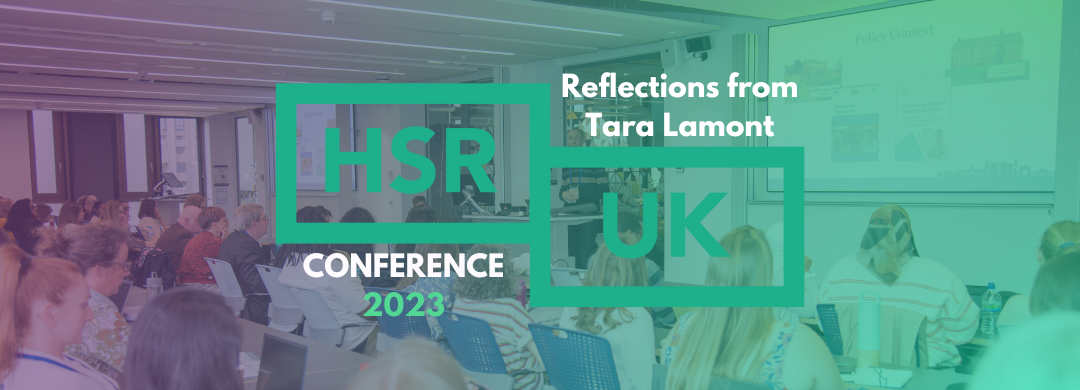HSR UK Trustee Tara Lamont shares her reflections on #HSRUK23, offering insights into some of the varied and innovative research discussions on offer at the conference...
Just coming back from HSR UK conference in Birmingham, stimulated and impressed by the range and quality of research talks over the week. In every session, there were thoughtful contributions on the most important issues of the day. How can we best organise care with limited resources? What difference does it make to add new staffing roles? What is the lasting legacy of service changes during the pandemic?
As ever, the only difficulty was choosing which session to attend. We were spoiled for choice. I had the chance to dip into some of the pre-recorded presentations of sessions I couldn’t attend and will look up some more which intrigue me. Just to give you a taster, these are some of the talks which caught my attention - with apologies to researchers for my crude take on their nuanced findings.
Davina Allen - Study of the `black box’ of nurses using professional judgement to deploy staff, noting the huge responsibility placed on individuals to make unsafe systems work. At the same time, this professional judgement is often not formally recognised or valued. Click here to view Davina's presentation.
Patrick Burch - Case study research of two extended access providers using observational methods. Suggests it can work well for simple acute issues but does not replicate the longitudinal element or local knowledge in routine `in hours’ general practice. Click here to view Patrick's presentation.
Liz Brewster - Using personal biographies and geospatial data to understand problems of recruitment and retention in `under-doctored’ areas. Insights into how career pathways of individuals and systems of workforce distribution affect inequalities. Location matters! Click here to view Liz's presentation.
Rakshita Parab - Using linked routine data to study impact of shielding during the pandemic. Largest study to examine effect of shielding clinically vulnerable people, a policy unique to this country, showed no effect in terms of COVID infection rates or mortality. Vulnerable people in fact appeared to be more exposed to hospital-based infection. Qualitative research from the same study by Alison Porter highlighted interesting distinctions between those who saw themselves as actively shielding (with some agency) versus being shielded, as well as the challenges for GPs in identifying the right people for the scheme. Click here to view Rakshita's presentation and here to view Alison's.
Cath Taylor -Realist synthesis on addressing staff burnout for nurses, paramedics, therapists. Shows that few solutions need be profession-specific but some staff are more at risk from those dealing with trauma to newly qualified staff and lone workers. Interventions are reactive and individual-focused, targeted at single episodes of pressure rather than cumulative stress. There was a case for giving psychological harm parity with industrial injury. Click here to view Cath's presentation.
Heather Cassie - Reducing unnecessary routine dental check-ups and treatment in line with best evidence. Work with dentists and patients indicates how hard it can be to do less or give up the reassurance of accepted practice, even when research findings are clear. Click here to view Heather's presentation.
These are just some of the presentations which captured my imagination. Which ones would you use to answer the question, `so what is health services research all about then’?

